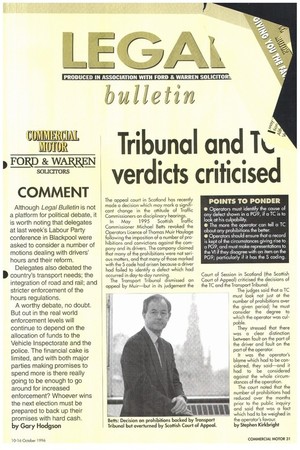p FORP & WARN
Page 33

If you've noticed an error in this article please click here to report it so we can fix it.
SOLICITORS
COMMENT
Tribunal and T1/4'; verdicts criticised
Although Legal Bulletin is not a platform for political debate, it is worth noting that delegates at last week's Labour Party conference in Blackpool were asked to consider a number of motions dealing with drivers' hours and their reform.
Delegates also debated the country's transport needs; the integration of road and rail; and stricter enforcement of the hours regulations.
A worthy debate, no doubt. But out in the real world enforcement levels will continue to depend on the allocation of funds to the Vehicle Inspectorate and the police. The financial cake is limited, and with both major parties making promises to spend more is there really going to be enough to go around for increased enforcement? Whoever wins the next election must be prepared to back up their promises with hard cash. by Gary Hodgson
The appeal court in Scotland has recently made a decision which may mark a significant change in the attitude of Traffic Commissioners on disciplinary hearings. In May 1995 Scottish Traffic Commissioner Michael Betts revoked the Operators Licence of Thomas Muir Haulage following the imposition of a number of prohibitions and convictions against the company and its drivers. The company claimed that many of the prohibitions were not serious matters, and that many of those marked with the 5 code had arisen because a driver had failed to identify a defect which had occurred in day-to-day running. The Transport Tribunal dismissed an appeal by Muir—but in its judgement the Court of Session in Scotland (the Scottish Court of Appeal) criticised the decisions of the TC and the Transport Tribunal. The judges said that a TC must look not just at the number of prohibitions over the given period; he must consider the degree to which the operator was culpable. They stressed that there was a clear distinction between fault on the part of the driver and fault on the part of the operator. It was the operator's blame which had to be considered, they said—and it had to be considered against the whole circumstances of the operation. The court noted that the number of prohibitions had reduced over the months prior to the public inquiry and said that was a fact which had to be weighed in the operator's favour. by Stephen Kirkbright
























































































































